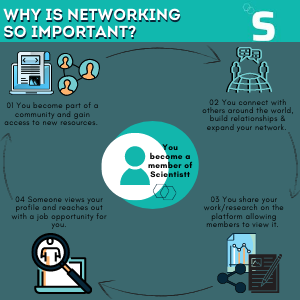To discuss the benefits of virtual networking for researchers we’re collaborating with Mariam Abood from Scientistt.
Mariam is a Masters student of Women’s Studies at the University of York and Content Manager for Scientistt.net.
Scientistt is an exciting new platform that offers virtual networking for researchers.
You’ll learn more about the platform and its features later in this blog.
![]()
Isolation and social media for researchers

The life of a writer and a researcher can often be a solitary experience (Ahmed, 2006).[1] According to a 2019 research study published in Nature[2], ‘more than one-third of respondents (36%) said that they have sought help for anxiety or depression caused by their PhD studies’, a third of which sought this help from places beyond their own institution.
Now more than ever interacting with others in our field is important. The pandemic has only worsened the feelings of loneliness and isolation, as we’re locked down in our homes without a clear prospect of when things will resume to how they used to be.
All of this highlights the importance of virtual networking for researchers in order to overcome loneliness, build connections, and meaningfully engage with others.
Therefore, it’s not a surprise that many turn to social media for connection. Studies have shown that social media is setting up new ways to network and organise.[3] Furthermore, social media is a vital tool in gathering momentum for movements, be it social activism or simply networking (Harlow, 2011)[4].
The benefits of virtual networking for researchers
There are several benefits of virtual networking for researchers. In this blog, I share three that we see matter most for the researchers we engage with daily.
Benefit 1: Growth through shared knowledge
Through networking, researchers can learn from others. When using social media, individuals customise their media usage to specific types of content.
According to Chung (2014)[5], ‘when using the Internet, individuals make strategic and active choices as to which pages to open, depending on their needs’.
This is evident in virtual learning patterns as Hamid et al (2015)[6] note that social networking has been a beneficial tool for the learning techniques of higher education institutions.
Benefit 2: Finding friends
Social networking platforms help individuals, especially those with relatively low self-esteem, to gain confidence by providing avenues for networking and self-disclosure (Forest and Wood, 2012)[7].
This helps these individuals on a spiritual level, and on an academic level too. Researchers can find friends through shared academic interests, thus exploring opportunities for academic fulfilment.
Benefit 3: Raising your profile
Sharing your work online with like-minded individuals can generate free publicity for your work. Moreover, a recent study conducted by Sharma and Sahu found that networking generally increases confidence in researchers.[8]
How researchers can network effectively online

1. Use online communities of support and events
Join communities in your research field to get peer support and be part of a trusted circle. For example, many departments have thriving online PGR communities that put on regular events to help network and gain support.
Social media is a great way to organise online and you can find your tribe of people using useful hashtags. For example, Twitter has ‘social bubbles’ dedicated to academia with associated hashtags such as:
Once you click on these hashtags you can see the conversation that is taking place and join in. You will be amazed how quickly you can pick up the pace and be part of an important discussion.
2. Engage with published literature and reach out to authors for further discussion
Researchers have to keep up with the current literature in their field. This is a great time to reach out to those authors and have a deeper discussion about the field and their findings. Use the tools available to connect with authors you read, using social media, and gain insights into their work that are not readily accessible online.
You’d be surprised how much people are willing to share when it comes to their work. Researchers take pride in their work (as they should!) and it is always a joyful experience to be recognised for one’s hard work and efforts.
3. Use a networking platform specifically designed for researchers
If you think that the current social media platforms are too generic and you’d like to join a platform that is aimed specifically at researchers, you can join Scientistt.
Scientistt is a free platform built for researchers, by researchers. The aim of Scinetistt is to offer ways in which researchers can network and connect with others in their field. Users can gain traction and recognition for their work through blogs and videos and share their content with a wide network, from science communicators to research leads.

Through Scientistt you join online communities of support and attend events organised by the postgraduate community. Scientistt is most active on Twitter @_scientistt where we often instigate conversations through the #AcademicTwitter hashtag.
You can see this in action in the Scientistt Sunday tweets about science and academic-related dwellings that get a high response rate from researchers.

As a member of the platform, you can also create and join interest-based groups, browse and bookmark conferences, access funding databases, apply to jobs and sign-up to free weekly virtual networking events with academic and industry professionals.
We hope you take the time in lockdown to connect with other researchers. Whether you join online communities of support, reach out to authors for further discussion or join Scientistt, remember you are not alone in your research journey! The benefits of virtual networking for researchers are plenty and you should take advantage of what is available to you.
Many thanks to Mariam and the Scientistt team for this blog. Make sure to follow them on Twitter @_scientistt. Let us know in the comments what you do to stay connected.
If you enjoyed this blog you may also enjoy reading Kate’s communication tips for engaging patients with research online.
References
[1] Ahmed, S. (2006) “Queer Phenomenology: Orientations, Objects, Others”, Durham and London: Duke University Press.
[2] Nature (2019) PhDs: The torturous truth, Accessed on 9/07/20202
[3] J.S. Juris, (2016) “Reflections on #Occupy Everywhere: Social Media, Public Space, and Emerging Logics of Aggression” in (ed) Feixa et al, “Youth, Space and Time”, Brill, Leiden.
[4] Harlow, S. (2011) Social media and social movements: Facebook and an online Guatemalan justice movement that moved offline, New media & Society 14(2) 225–243 DOI: 10.1177/1461444811410408
[5] Jae Eun Chung (2014) Social Networking in Online Support Groups for Health: How Online Social Networking Benefits Patients, Journal of Health Communication, 19:6, 639-659, DOI: 10.1080/10810730.2012.757396
[6] Suraya Hamid, Jenny Waycott, Sherah Kurnia, Shanton Chang (2015), Understanding students’ perceptions of the benefits of online social networking use for teaching and learning, The Internet and Higher Education, Volume 26, pp. 1-9, ISSN 1096-7516.
[7] Forest, A. and Wood, J. (2012), When Social Networking Is Not Working: Individuals With Low Self-Esteem Recognize but Do Not Reap the Benefits of Self-Disclosure on Facebook, Psychological Science, 23(3) 295–302
[8] Sharma and Sahu, 2013, International Journal of Information and Computation Technology. ISSN 0974-2239, 3 (11), pp. 1211-1216

